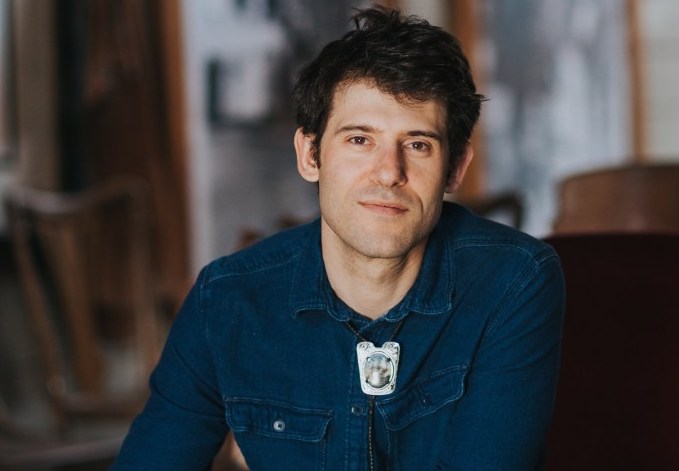
Photo credit: Olive & West Photography
Tell us about your tour vehicle. Any notable breakdown stories?
In the COVID era, my tour vehicle is a webcam. That said, I toured steadily from June of 2009 to March of 2020, and had several vehicles come and go. Generally, I bought older cars, ran them up to 230k miles, and sold them while they were still worth anything. Toyotas are my favorite.
One time, a lousy mechanic left a few hoses disconnected in my engine, so I blew a head gasket- however, I had to be in Santa Fe in 48hrs for my next gig. So, I drove the 300 plus miles from Carbondale, CO to Santa Fe, NM at 35 mph with a smoking engine, over two or three mountain passes. I arrived on time.
How do you eat cheaply and/or healthy while on tour?
Depending on where I’m staying, people generally feed me breakfast and dinner, which I appreciate. Since I only have lunch to worry about, I try not to skimp. The salad bar at Whole Foods is a great, usually affordable meal- good for cleansing whatever gunk you’ve been eating. I try to pack fruits and veggies that will last for a while, in case I’m in a food desert for a couple days. I’ll eat raw cucumbers, sweet peppers, and carrots. Organic canned soup and trail mix are also road food staples.
How many strings do you break in a typical year? How much does it cost to replace them?
I hope I don’t jinx it by telling you, but I don’t break strings. I haven’t in years. Usually, I’ll leave a set on for 3-6 months, and longer on my electric guitars. I prefer the sound of old strings, but they become more fickle to tune after 2-3 months of steady play, so that’s when I ditch them.
Where do you rehearse?
My rehearsal space is wherever I am. Given that I was traveling 70-100 days a year, I couldn’t plan on rehearsing in one specific place- I just made it happen along the way. I’ve practiced in the back of a camper van on I-70, a highway pullout in Wyoming, a green room in La Grange, and numerous rickety barns.
What was the title and a sample lyric from the first song that you wrote?
The first song I wrote is called “Please Don’t Die, But Do.” I wish I could find the lyrics, but they’re long gone. It was a satirical, tongue in cheek love song, and it was terrible. I was probably 20 when I wrote it, and had just heard Todd Snider’s “Statistician’s Blues” and thought, “I can do that!” Turns out you can write hundreds of songs and still be chasing Todd Snider.
Describe your first gig.
My first show was for a Battle of the Bands in high school. I had terrible stage fright, so to compensate, I would dance erratically and hump the amplifiers during guitar solos. I don’t think that counts as my first gig since it was through my school. The first gig I considered a gig was playing guitar in the house band for an open mic night in Aspen, CO. I was 18, and would sneak in through the delivery door with my guitar and amp, so the bouncer wouldn’t card me. I was paid in french fries.
What was your last day job? What was your favorite day job?
Day jobs come and go. My last one was in 2019, at a small, hippie grocery store. My favorite was as a sound engineer and booking agent for a music venue in North Carolina. I learned a lot about how artists organize their touring and record releases. I also learned how many musicians (and venues) are crushed by debt, poverty, and their own bad habits. It was heartbreaking, and educational.
How has your music-related income changed over the past 5-10 years? What do you expect it to look like 5-10 years from now?
Ten years ago, most of my musical income could be calculated in beer and bartered vegetables from the farmer’s market. Five years ago, I made my living performing cover songs at weddings, breweries, and private parties. By 2020, my income was mainly people paying to hear me sing my original songs (which was an absolute dream come true, and I pinched myself daily). Looking ahead, I’m working to diversify. Performance, merchandise, royalties, lessons and workshops, consulting, audio engineering, production, etc. Having consistent income from several sources creates stability- which is appealing, given the global situation.
What one thing do you know now that you had wished you knew when you started your career in music?
Once you’re seen in public with a guitar, there is a myth people tell you. They say, “you’ll be famous one day” or “someone is going to discover you.” This is mostly untrue, and glosses over the tremendous amount of ongoing work and practice that successful musicians undertake. The best artists make their own opportunities, and work overtime to make the most of what comes their way. I wish people talked about this more, instead of the “get discovered” fairytale which pins every hope and dream on a single powerful person’s discovery of your music. In reality, a career is built on thousands of people discovering and sharing your music, not just one.
